#kate summerscale
Explore tagged Tumblr posts
Text
#NicPicDay70. Nicola in my ears narrating Kate Summerscale’s “The Peepshow” about the murders at Rillington Place, glass of Pinot🍷…a very good night. Pre-ordered 7 months ago, worth the wait! 9 hours of pure Nic!💜


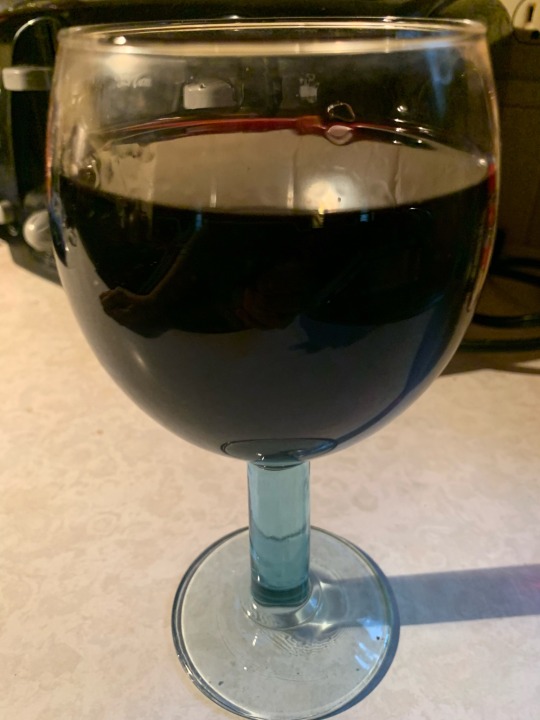
11 notes
·
View notes
Text
"THE SUSPICIONS OF MR. WHICHER: THE MURDER ON ANGEL LANE" (2013) Review

"THE SUSPICIONS OF MR. WHICHER: THE MURDER ON ANGEL LANE" (2013) Review
Over a decade ago, the ITV network aired a television adaptation of Kate Summerscale's 2008 true life crime book, "The Suspicions of Mr. Whicher or The Murder at Road Hill House", starring Paddy Considine. The movie proved to be such a success that producer Mark Redhead had followed up with three other television productions featuring the main character, Jack Whicher. The first of these sequels was 2013's "THE SUSPICIONS OF MR. WHICHER: THE MURDER ON ANGEL LANE".
The 2013 television movie began with Jack Whicher coming to the aid of a wealthy middle-age woman, when a young thief snatches her purse inside a London pub in London. After retrieving her purse, Whicher discovers that the woman, Susan Spencer, is searching for her missing niece, a 16 year-old girl named Mary Drew. Miss Spencer learns of Whicher's old position as a police detective and hires him to find the missing girl. Whicher eventually discovers Mary's brutally murdered body inside the police morgue. Both eventually learn that before her death, Mary had given birth to a child and someone had stolen a family heirloom from her. Miss Spencer hires Whicher to act as her private consultant and find Mary's killer.
When I first saw "THE MURDER ON ANGEL LANE", I had assumed the story began sometime after the events of 2011's "THE SUSPICIONS OF MR. WHICHER: THE MURDER AT ROAD HOUSE HILL". It took a rewatch of this second television movie for me to realize that it was set during the events of the 2011 movie - sometime between the four or five years between Mr. Whicher's failure to get the killer prosecuted for murder and the latter's eventual confession. I was able to ascertain this conclusion, due to the hostile behavior of Police Commissioner Richard Mayne toward Whicher and the one of the supporting character's comments. This setting also explained Whicher's occasional doubts regarding his skills as a detective. Now whether the other two Whicher television movies that followed were also set during this period is a matter I will eventually discover.
Unlike "THE MURDER AT ROAD HOUSE HILL", "THE MURDER ON ANGEL LANE" proved to be a genuine "whodunnit" story. This particular case was not some true crime narrative. And Whicher did not discover the antagonist's identity until the finale act. I am not saying that this particular difference made the 2013 television movie an improvement over the first one. But in a way, it felt a little refreshing to view a murder mystery/period drama, instead of a mere true life case set in the far past. "THE MURDER ON ANGEL LANE" started as an investigation into the disappearance of a well-born adolescent managed to transform into a lot more. Like "THE MURDER AT ROAD HOUSE HILL", this story also proved to be a family drama beset with murder, betrayal and corruption. But unlike the 2011 movie, greed also play a major role in "THE MURDER ON ANGEL LANE". I thought screenwriter Neil McKay and director Christopher Menaul handled the movie's narrative very well, with a minor exception or two. I also admired how McKay used the unresolved events of THE MURDER AT ROAD HOUSE HILL" to not only provide the Whicher character as an emotional obstacle for him to overcome, but also an excuse to place him in the dangerous situation that he found himself in the movie's final act.
I do have a few complaints about the plot for "THE MURDER IN ANGEL LANE". And it centers around a small group of quibbles regarding the television movie's final act. Whicher's investigation led him to a third visit at an insane asylum, where he found himself incarcerated as a patient. A part of me felt relieved that this particular scenario lasted less than five minutes. However, another part of me found this sequence rushed and contrived for it did not take Whicher long to receive help in making his escape. Following on the heels of the asylum sequence, Whicher finally confronted the murderer. But he did so alone . . . and without contacting his old friend, Chief Inspector Adolphus "Dolly" Williamson or other members of the Metropolitan Police. I understand why Neil McKay had written the confrontation scene this way. I simply found it implausible and wish he could have created another way to close the case.
I certainly had no complaints about the movie's production values. David Roger returned to the "MR. WHICHER" series to serve as production designer. As he did for "THE MURDER AT ROAD HOUSE HILL", Roger managed to re-create the look and style of early 1860s Britain with the additional work of Paul Ghirardani's art direction and the set decorations of Jo Kornstein, who had also worked on the "ROAD HOUSE HILL" production. Only in this production, his vision extended to the streets of London. Tim Palmer served as the film's cinematographer. I thought he did a solid job, but his work did not exactly blow my mind. Lucinda Wright also returned to serve as the movie's costume designer. As she did for the 2011 television movie, her work for "THE MURDER ON ANGEL LANE" perfectly recaptured the early-to-mid 1860s without being either shoddy or over-the-top.
Paddy Considine returned to reprise his role as Jack Whicher. As he had done in the first movie, the actor did an excellent job of quietly capturing the character's reserve nature, intelligence and skill for criminal investigation. However, Considine managed to add an extra touch of poignancy, as he project Whicher's occasional bouts of insecurity in the wake over the Road House Hill case and his minor failures during his investigation of this case. Both William Beck and Tim Piggott-Smith reprised their roles as "Dolly" Williamson and Commissioner Mayne from from the first film. Like Considine, both actors gave first-rate performances. And both added extra touches to their performances - especially in their characters' attitudes toward Whicher - in the wake of the Road House Hill debacle. Olivia Colman provided the movie's emotional center as the well-born Susan Spencer, who hired Whicher to first, find her niece Mary Drew and later, find the latter's killer. She and Considine, who had co-starred in the 2007 comedy, "HOT FUZZ", worked very well together. Shaun Dingwall gave a very subtle performance as Inspector George Lock, the main investigator of Mary's murder and the only one willing to give him a chance in helping the police. The television movie also featured solid performances from Mark Bazeley, Alistair Petrie, Billy Postlewaite, Angela Terence, Justine Mitchell, Sean Baker, Sam Barnard, Christopher Harper and Paul Longely.
Of the four "MR. WHICHER" television movies, I must admit that "THE SUSPICIONS OF MR. WHICHER: THE MURDER ON ANGEL LANE" is my least favorite. I believe the last fifteen to twenty minutes had been marred by some contrived writing that I believe had rushed the narrative's pacing. However, I still believe it was a first-rate production in which screenwriter Neil McKay had created an intriguing whodunnit involving a major family feud, betrayal and greed. And director Christopher Menaul, along with a talented cast led by Paddy Considine had skillfully conveyed McKay's story to the screen.
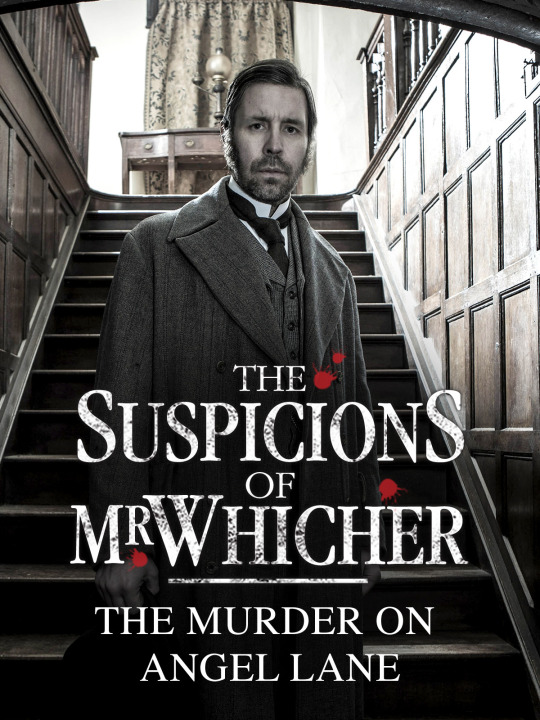
#kate summerscale#neil mckay#christopher menaul#jack whicher#the suspicions of mr. whicher#the suspicions of mr. whicher: the murder on angel lane#paddy considine#olivia colman#william beck#shaun dingwall#alistair petrie#victorian age#tim piggott-smith#justin edwards#billy postlethwaite#siobahn o'neill#mark bazeley#angela terence#justine mitchell#sean baker#sam bernard#christine harper#paul longely#road house hill#costume drama#period drama#period dramas
3 notes
·
View notes
Text
Winding Up the Week #399
An end of week recap “Fiction is the lie through which we tell the truth.” – Albert Camus This is a post in which I summarise books read, reviewed and currently on my TBR shelf. In addition to a variety of literary titbits, I look ahead to forthcoming features, see what’s on the nightstand and keep readers abreast of various book-related happenings. CHATTERBOOKS >> If you are planning a reading…
#Albert Camus#Cynthia Pelayo#Han Kang#Joan Aiken#Kate Summerscale#Kateryna Zarembo#Sarah Seltzer#South Korean Fiction#Witch Week
0 notes
Text
Usually in an unsolved murder case the public feared that the killer might strike again. Here, though, the fear was that he or she could be duplicated in any home. The case undermined the very idea that a locked house-hold was safe. Until it was solved, an English mother would sleep uneasily, haunted with the idea that her house harboured a child-killer - it could be her husband, her nanny, her daughter.
Kate Summerscale, The Suspicions of Mr. Whicher: Or the Murder at Road Hill House
0 notes
Text
Kate Summerscale – Fobiler ve Maniler Kitabı (2023)
Homofobi gibi bildiğimiz fobilerden insanı şaşırtan yumurta, saç, sessizlik korkularına, hatta her şeyden (pantofobi) korkmaya dek uzanan çok sayıda fobi mevcut. Anlamlandıramadığımız mani ve fobilerimizin arkasında ne yatıyor? Bizi pençesine almış bu takıntılardan kurtulmanın bir yolu yok mudur? Peki, dünyada bunları bir tek biz mi yaşıyoruz? Kate Summerscale, ‘Fobiler ve Maniler Kitabı: A’dan…
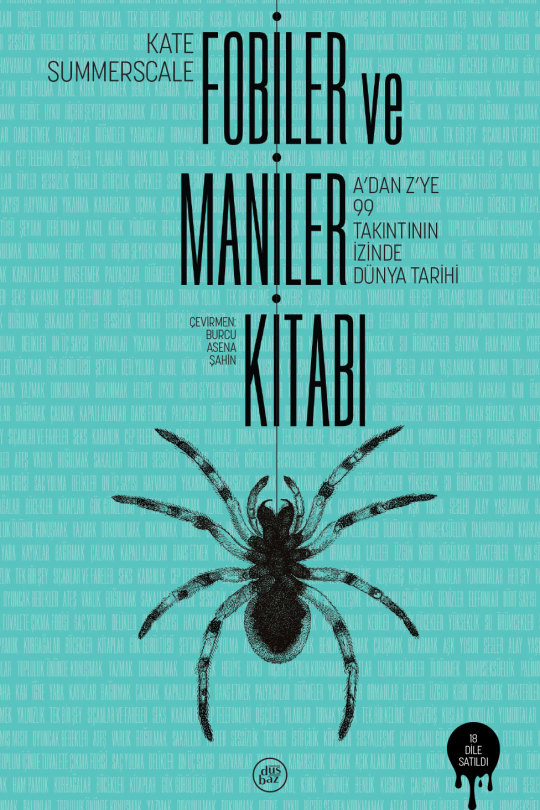
View On WordPress
#A’dan Z’ye 99 Takıntının İzinde Dünya Tarihi#Burcu Asena Şahin#Düşbaz Kitaplar#Fobiler ve Maniler Kitabı#Kate Summerscale
0 notes
Text
2025 Women’s Prize for Non-Fiction Longlist
Autocracy, Inc.: The Dictators Who Want to Run the World by Anne Applebaum
Embers of the Hands: Hidden Histories of the Viking Age by Eleanor Barraclough
The Eagle and the Hart: The Tragedy of Richard II and Henry IV by Helen Castor
A Thousand Threads by Neneh Cherry
The Story of a Heart by Rachel Clarke
Raising Hare by Chloe Dalton
Ootlin by Jenni Fagan
Why Fish Don’t Exist: A Story of Loss, Love and the Hidden Order of Life by Lulu Miller
Agent Zo: The Untold Story of Fearless WW2 Resistance Fighter Elżbieta Zawacka by Clare Mulley
By the Fire We Carry: The Generations-Long Fight for Justice on Native Land by Rebecca Nagle
Wild Thing: A Life of Paul Gauguin by Sue Prideaux
What the Wild Sea Can Be: The Future of the World’s Ocean by Helen Scales
The Peepshow: The Murders at 10 Rillington Place by Kate Summerscale
Sister in Law: Fighting for Justice in a System Designed by Men by Harriet Wistrich
Tracker by Alexis Wright
Private Revolutions: Coming of Age in a New China by Yuan Yang
20 notes
·
View notes
Text
INTERVIEW
Peter Capaldi: 'People ask me to tell them to #@*! off'
After playing everyone's favourite foul-mouthed spin doctor in The Thick of It, Peter Capaldi was surely destined for Hollywood. But as the actor tells Gerard Gilbert, he's no Hugh Laurie...
Saturday 09 April 2011 00:00 BST
Damn and blast Twitter. I had been hoping to be the bearer of good tidings – that The Thick of It, supposedly dead and buried with New Labour, is set to return. Instead, the show's creator, Armando Iannucci, has already Tweeted his followers that: "Work begins on scripts next month". I had heard the happy news from the man without whom The Thick of It would merely be a very funny political satire instead of the second greatest British sitcom of the Noughties (after Peep Show; discuss) – Malcolm Tucker himself, Scottish actor Peter Capaldi.
"Well, that's kind of you to say," says Capaldi, referring to his role in its greatness, when we meet high above a beautiful spring morning in London, in ITV's South Bank offices. I had been told that the interview might not take place because of a "family tragedy", the nature of which I had absolutely no intention of prying into, but he seems relaxed and in good humour. "The show's back for 2012 for the Olympics," he says. "We've already got Roger Allam, who's our Conservative minister, and we have Jo Scanlan, who plays the civil servant, so there'll still be a team that the audience is familiar with. But there will also be new Liberal Democratic elements, so I was very surprised that they asked me back, because I'm not very sure what role I will have."
But then The Thick of It without Malcolm Tucker would be like The Office without David Brent. A spin doctor whose inventive use of bad language (the show famously has a "swearing consultant") has given birth to a rich back-catalogue of filthy and very funny "Tuckerisms", including the following random (and printable) sample from the most recent series: (talking of a minister) "He's so dense, light bends around him", (of another MP who has just turned down the Northern Ireland Office) "Do you know that 90 per cent of house dust is made of dead human skin? That's what you are to me", as well as the horribly funny "I'll be with you in two shakes of a crying baby".
But I'm glad for more reasons than my own selfish enjoyment that The Thick of It is set to return, because frankly I was starting to get a little worried about Capaldi. He has form, you see. His career has been a succession of peaks and troughs, the high points including being plucked from obscurity in his mid-twenties to play opposite Burt Lancaster in the 1983 film Local Hero, and, 12 years later, winning an Oscar for Best Short Film, his self-penned Franz Kafka's It's a Wonderful Life. And now I was concerned that he wasn't capitalising on the success of The Thick of It and its movie spin-off In the Loop, doubts that emerged at Christmas when I noticed him riding a camel in BBC1's Nativity. He's been over to America several times since In the Loop opened there to critical acclaim, but says: "My problem is that there's something in my character... I think it's just laziness.
"At the moment everybody wants you to go [to America] and do the pilot season – they keep saying, 'Don't you want to be Hugh Laurie?'. I mean I love Hugh Laurie but I don't want to be a guy who goes to work every day for nine months of the year in a corner of Burbank. I really don't. I like doing a bit here and a bit there and strange things, and I think that's held me back."
One of those "bits" is the reason we're meeting – to promote his role in a new ITV period drama, The Suspicions of Mr Whicher, a rather superior Victorian whodunit adapted from Kate Summerscale's novel – but it's not even as if he has the lead role (Paddy Considine plays the eponymous Mr Whicher). Capaldi plays, instead, the father of the prime suspect. "I originally thought it's not my kind of thing. This is a Sunday evening... ITV... chocolate-boxy Victorian thing, but then the director spoke to me about how he wanted to do it, which was much bleaker. And Paddy was in it as well and that signals a certain thing about it".
And frankly it's nice for Capaldi to be able to pick and choose roles, for as recently as 2005, when The Thick of It came along, he was on the verge of packing it all in. "What I've learnt being an actor is that you've got to be lucky. I got less lucky and nobody was interested. If a part came up it would be for the main corpse's friend's brother who was having problems with his marriage. Two scenes. You'd have to go up for that and then you wouldn't get it and then you'd just feel like shit.
"I suddenly got flickers of interest for two jobs and one of them was Armando's. I was called in to read for the BBC in the morning, for a part I could do standing on my head and I know I'm not going to get this part, so by the time I met Armando two hours later I'd had enough of the whole thing."
Capaldi says his heart sank when Iannucci announced that he wanted to improvise a scene. "I hated improvisation because in my early days as an actor, improvisation meant somebody had just come down from Oxford and they were doing a play above a pub in Kentish Town and the biggest ego would win. But with Malcolm Tucker, I don't quite know why, but I could feel a little click where I knew how to do this."
Perhaps the most surprising aspect of this audition was that Capaldi and Iannucci had not met earlier. Despite their age difference (Capaldi is 53, while Iannucci is 47) they not only share the same Scottish-Italian upbringing, but also hail from the same tenement blocks of the Springburn area of Glasgow. "I'm amazed that my mother never mentioned it to me before," says Capaldi. "I said to her that I'm working with Armando Iannucci and she said, 'Oh, I know Armando... he built the little cupboard we had in our scullery'. And of course she was talking about Armando's father who was also called Armando. He did a bit of joinery and stuff."
Classically for his heritage, Capaldi's parents were in the ice-cream business. "We had a café that was at the bottom of the tenement that we lived in," he says. "My childhood growing up in that part of Glasgow always sounds like some kind of sub-Catherine Cookson novel of earthy working-class immigrant life, which to some extent it was, but it wasn't really as colourful that."
His parents moved the family – including an older brother and a younger sister – to suburbia, "a Wimpy house in Bishopbriggs", where Capaldi's skill at drawing eventually led to a place at the Glasgow School of Art, his peers including the future official war artist, Peter Howson.
"It was 1976 and punk was just exploding," he says about forming a band called The Dreamboys. "The worst name for any band ever – especially a punk band. We were originally called The Bastards From Hell. The trouble was, we were always much more interested in being funny than being serious" – hardly surprising, with Craig Ferguson, the future stand-up turned US talk-show host, on drums. "We were the only band John Peel never gave a session to in Glasgow."
They did, however, support Gary Glitter one night after the real support band dropped out. But Capaldi's interest in music and art was about to be eclipsed when, returning home drunk one night from the pub, he found the Gregory's Girl film director Bill Forsyth chatting to his landlady, a costume designer. "I think I just riffed for half an hour and somewhere along the line he said, 'I'm going to get that person in my film', but I didn't know it was going to be a proper film."
Local Hero was a proper film with a proper big Hollywood movie star, Burt Lancaster, playing a Texan oil tycoon with designs on a Scottish fishing village. Its Ealing-esque charm helped turn Local Hero into a global hit, and encouraged Capaldi to seek his fortune in London. "I didn't have an agent... the world of acting was very alien. The sense I got was that everything about me was wrong: I spoke wrong, I walked wrong, I didn't have any training, so my task was to rub myself out and begin again.
"If I'd been wise I would have gone straight to America where people still to this day recognise me in the street, but then there's every chance that nothing would have happened. I'd have become an alcoholic Scotsman living bitterly in San Diego with pictures of me and Burt Lancaster on the wall of my trattoria that nobody comes to."
This last comic riff is typical of Capaldi, a colourful and naturally amusing speaker who bafflingly claims he rarely does interviews because he never knows what to say. But back to London in the mid-1980s, where our clueless ingénu finally lands a job at the Young Vic. "I absolutely loved it. I was starting to learn about acting, and gradually I was getting bits and pieces of telly – Crown Court and Minder. Times were different then. Nowadays, kids... young actors... they go straight to LA before they've even done anything."
It was around this time that Capaldi says he started becoming chippy about not being English. "It was clear that people would have preferred me to be Daniel Day Lewis," he says. "I just kept thinking there is no market for me, so I would become this other thing... a young, English, middle-class man. But that didn't work either, because there's plenty of those.
"For a long time I carried this... it's not resentment, it's fear. It was a fear of not being good enough, not being Daniel, or not being Hugh Grant or not being Colin Firth. It took me years to realise it was me bringing that stuff to the table – that when I would get into a situation if I was working with people, I'd blame them. Once I realised that it was a great eye-opener." When did that happen? "Probably not until I was about 40."
In frustration, Capaldi decided to write and direct his own short film, Franz Kafka's It's a Wonderful Life, incredibly winning an Oscar for it. "That was very confusing for me and a lot of people because I won it as an actor who was having a go at directing. Luckily, I had another script, over which a bidding war exploded. That's why I've got a house in Crouch End and I'll always be grateful to Miramax for buying it.
"I thought I was going to be Ridley Scott now, or Steven Spielberg, and I flew over to New York to set up production and then they said they're not going to do it. It was over. I had to work because I'd spent all my money – on the house – and I remember the Oscars after the Oscar I won, I was standing in mud in a field in Rickmansworth directing a dog food commercial."
Capaldi shares that house in Crouch End with his wife, Elaine, an actor-turned-TV producer, and their 18-year-old daughter, Cissie. But the familiar pattern was reasserting itself, with a big break followed by Capaldi's seeming inability, or unwillingness, to capitalise on it. After The Thick of It, it seems unlikely that Capaldi will again fall into the slough of despond in which Iannucci found him in 2005. He may remain a "jobbing actor" (his words), but the jobs will be bigger, the auditions less humiliating. "It definitely changed the way people in the business perceived me," he says. And playing Malcolm Tucker changed the way viewers perceive him, too. He played a doctor recently in the Jo Brand hospital sitcom, Getting On (which he also directed) and he brought a reptilian menace to the role that has a lot to do with the baggage he now carries from Malcolm Tucker. This new persona has even affected the general public.
"Instead of asking for autographs, people ask me to tell them to 'Fuck off' ... sometimes I mean it," he says. "I saw a thing with Alastair Campbell the other day where he said exactly the same thing and I thought, hey, that's my line..."
Has he ever met Campbell? "Once, when Channel 4 thought it'd be funny to place us next to each other for a dinner. I'd always avoided him because I'd feared he'd be very charming, which he was, but it was very interesting and it did actually affect the way I played the part. Not that anybody ever said to me that Tucker was Alastair Campbell. We spoke as much about Peter Mandelson, or Bernard Ingham, but gradually the dynamic of the show begins to create its own character."
Tucker is a great comedy creation, and Capaldi is acutely aware that such characters don't grow on trees. "Maybe it's because I've been an actor for such a long time, but I think, unless you're a big star, you don't really have much control over anything. I've never been able to make any plans. The only time I've tried to make plans the cosmic sledgehammer has intervened and something else has happened. You just have to wait and see what comes your way, so that's what I do".
'The Suspicions of Mr Whicher', ITV1, Easter Monday
Peter Capaldi: a life on screen
1958 Born in Glasgow, to Scottish-Italian parents who run an ice-cream business
1976 Forms a punk band, The Dreamboys, with Craig Ferguson (now a comedian) on drums
1983 At 23, is spotted by director Bill Forsyth and cast with Burt Lancaster in Local Hero
1988 Having moved to London to work as a jobbing actor, he appears in Stephen Frears' Dangerous Liaisons
1993 Writes and stars in his first film, Soft Top Hard Shoulder
1995 The next film he writes, Franz Kafka's It's a Wonderful Life, starring Richard E Grant, wins an Oscar for Best Short Film. Off the back of this success, his script Moon Man is bought by Miramax. It never gets made
2001 His next film, Strictly Sinatra, flops at the box office and he returns to acting, with roles in Fortysomething, Judge John Deed and Foyle's War
2005 Finds fame playing a spin doctor in the TV series The Thick of It, Armando Iannucci's acclaimed political satire
2009 Stars in In The Loop, a big-screen spin-off that gets a screenplay Oscar nomination
2011 Directs Jo Brand's BBC hospital drama Getting On; appears in ITV's The Suspicions of Mr Whicher
By Holly Williams
12 notes
·
View notes
Text
2024 Reading Round Up
A lot of good books this year! Technically broke my record from last year because I read a pulp not listed, an NA book not listed and it should be noted I read the first half of Gabriel García Márquez’s One Hundred Years of Solitude and then had to pause it. So technically 22.5 altogether for the year.
Stand outs of the year are in bold.
The Haunting of Alma Feilding by Kate Summerscale. A very interesting dive into the case of a purported medium. While Summerscale comes off as too credulous at times the conclusion of the piece dispels that tone and the research into the human drama of this ‘haunting’ is a terrific read.
The Prince by Niccolò Machiavelli, translated by Harvey C. Mansfield. A classic and a standard. This was my first read through and while it was interesting I came away knowing I hadn’t been able to digest it as I had not discussed it with fellow readers. The supplementary letters from Machiavelli gave a dimension to him that was very touching.
A Coney Island of the Mind by Lawrence Ferlinghetti. I can’t speak to all of my influences’ influences but as a Tom Waits lover I figured I’d give Ferlinghetti a try. He was alright. I don’t read a lot of poetry so it was a case of sitting there going ‘is this good or bad? Am I stupid or is he?’
First, Become Ashes by K M Szpara. A sexy romp by a local Bmore writer. Reading the voice of another queer writer was interesting, especially since this book makes it clear we have a few of the same cultural reference points.
The Black Count by Tom Reiss. A biography of the half-Haitian Revolutionary French General Alex Dumas, father of novelist Alexandre Dumas and widely believed to be the real life template for his son’s character The Count of Monte Cristo. While not a lot of the man’s personality comes through the page (due in part to a lack of access to his letters and other first person accounts) this book splendidly constructs the world Dumas grew up in, the revolutionary nation he served, and the caprice of one Napoleon Bonaparte whose disdain and poor leadership ultimately sent General Dumas into a fatal decline. Highly recommend this for history buffs who want to learn more about race in the 1700’s!
Guards! Guards! by Terry Pratchett. First and only Pratchett I’ve read! Very fun and buoyant, I would recommend this as a starting point for anyone who wants to get into Uncle Terry’s work.
1491 by Charles C. Mann. Indisputably my pick for Nonfiction of the Year. A digest of thousands of years of history in the Western Hemisphere, detailing what we’ve learned about live in the Americas pre-Columbus. The book endeavors to center the pre-Columbian ages but also gives a number of illuminating accounts about post-Columbian life in the Western Hemisphere. Absolutely incredible. If you care at all about history this is a must read, it will challenge or altogether evaporate the misinformation still taught about Native American history and it tells a powerful story of how fragile the lives of whole empires can be.
Song of Achilles by Madeline Miller. And disputably the Fiction of the Year! I had heard about this book and delayed in reading it until I cracked it on vacation. As of the first sentence I was locked in. This book MAKES you read it. Its rapid pace, lyrical prose and the deep respect and love for the ancient epics make it an incredible read. Is this Trojan War fanfic? Yes. Is it its own masterwork? Absolutely. It tells the story of Achilles from the perspective of Patroclus, the human who loves him. The parts of Troy that are updated for the modern audience all serve to breathe new life into the ancient story. Highly, highly recommend!
Jesus and John Wayne: How White Evangelicals Corrupted a Faith and Fractured a Nation, by Kristen Kobes Du Mez. A tough read. Some months after reading someone mentioned ‘oh, this must’ve been someone’s dissertation.’ which I’m inclined to agree with here. This book asks ‘how did 80% of white evangelicals end up voting for Trump in 2016?’ and details how shifting social tides spurred evangelicals further and further right. It answers this question by detailing the theological and cultural waters of the evangelical space from the 1920’s to 2016, including such troubling things as the evangelical and Catholic push against women’s lib, the privatizing of schools to avoid federal desegregation and the hollowing out of the Southern Baptist Church to make it a biblical literalist arm of the larger American Protestant and evangelical movement. The author focuses on the theological disrespect of women more than anything, a drum that should beat but undercuts similar hatred based on race as well. If you want to be that picture of Rust Cohle smoking a cigarette read this book.
Tell the Wolves I’m Home, by Carol Rifka Brunt. A novel about a girl coming of age in the 80’s whose uncle dies of AIDS. She struggles with the grief and love she feels for him and his boyfriend, who is estranged from their family but becomes a ballast for her and her sister as they grieve. If I’d read this book as a young sprog I know it would’ve reshaped my brain.
The Art Thief, by Mark Finkel. The true story of a couple who stole BILLIONS in paintings, statuary, weaponry and other art objects from the 90’s to the 10’s. And I know what you’re thinking ‘oh, but Helen you love thieves!’ I do but the damage and destruction caused and the loss of cultural icons that came from these crimes is truly unconscionable. Very fun read that’ll make you want to steal reproducible objects even more.
When Darkness Loves Us, by Elizabeth Engstrom. WOOO BOY. A TERRIFYING short story that will sit with you ever after. The companion story in this collection is always wonderful but the horror and blackness of When Darkness is the stand out of the two.
The Picture of Dorian Gray, by Oscar Wilde. Somehow I’d gotten this far as a turn of the century fag without reading Wilde. No longer! A great read, very enriching and while Wilde’s voice is a little pithy for my tastes (Pratchett too) it is undeniably a terrific story. Looking forward to reading the original magazine edition, recommended to me as a closer version of what Wilde always intended the story to be.
Vision of Heaven and Hell Before Dante, by Eileen Gardiner. Research for my DnD game set in Hell. I’ve yet to read the Inferno but this was a great way to get a sense of how the early modern period viewed Hell and its various explorers.
‘Salem’s Lot by Stephen King. Very fun romp, the only King I’ve read but I thoroughly enjoyed it. The schmoe parts of him are clearly heard in his writing but in no way detract from the book. That post about him looking like a cartoon rat seem very true after reading this book, not in a bad way.
Cursed Bread by Sophie Mackintosh. Interesting read I picked up, telling a fictitious version of the real life mass ergot poisoning in the French town of Pont-Saint-Esprit. A baker’s wife struggles with her sexless marriage and her attraction to a socialite couple who move into town just before the town descends into madness. Interesting, glad I read it, still not sure quite what I think of it.
Benjamin ‘Bugsy’ Siegel: The Gangster, The Flamingo and The Making of Modern Las Vegas by Larry Gragg. A somehow spellbindingly boring biography of this famously flash mobster. Also read for research and while I did learn a bit this book is now mostly a bibliography I use to find more interesting books about the same people.
How to Change Your Mind by Michael Polland. A close close close! runner up for Best Nonfiction. This book investigates the science of psychedelic medicine, starting with LSD’s original distillation in the 30’s up to new psychedelic therapy in the 10’s. A wonderful book, highly interesting, personal and full of enlightening information. Highly recommend!
The Annotated Big Sleep by Raymond Chandler with editing and annotations by Owen Hill, Pamela Jackson and Anthony Dean Rizzuto. The return of the old favorite. I just love Chandler and the BS, y’all know this. Recommend this for second time readers and those who want to know more about the context of LA in the 30s and Chandler and his influences. For first time readers I still recommend just grabbing a regular paperback and letting the story read itself to you.
3 notes
·
View notes
Text
Intense observation, close physical checks, even suspicion could feel like desire.
-- Kate Summerscale
3 notes
·
View notes
Text
2024 TBR Pile of Good Intentions
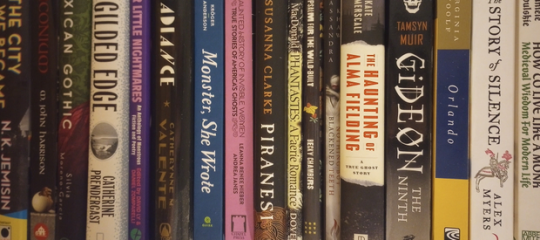
(crossposted to Patreon)
This year’s TBR pile looks very much like last year’s (hence the reused banner image) but last year was also a shitshow so I’m giving myself a do-over. Although looking back, I did actually manage to read two (2) of the books on last year’s list! I even wrote about How to Live Like a Monk for my patrons! The other one was Mexican Gothic… Y’know, I should really write about Mexican Gothic…
Lion’s Paw Reads: (aka books I’m planning to do patron content about)
Orlando, by Virginia Woolf
A Haunted History of Invisible Women: True Stories of America’s Ghosts, by Leanna Renee Hieber and Andrea Janes
The Haunting of Alma Fielding, by Kate Summerscale
The Octagon House: A Home for All, by Orson Squire Fowler
Other Reads (Fiction):
Our Wives Under the Sea, by Julia Armfield
The Ladies of Grace Adieu and Other Stories, by Susana Clarke
Radiance, by Catherynne M. Valente
Gideon the Ninth, by Tamsin Muir
Piranesi, by Susanna Clarke
The City We Became, by N.K. Jemison
Nothing but Blackened Teeth, by Cassandra Khaw
The Story of Silence, Alex Myers
A Psalm for the Wild-Built, by Becky Chambers
Viriconium, by M. John Harrison
Queer Little Nightmares: An Anthology of Monstrous Fiction and Poetry, Edited by David Ly & Daniel Zomparelli
What Moves the Dead, by T. Kingfisher *I actually finished this last week!
Phantastes: A Faerie Romance, by George MacDonald
Other Reads (Non-Fiction):
City of Sin, by Catherine Arnold
The Mutual Admiration Society, by Mo Moulton
Monster, She Wrote, by Lisa Kröger and Melanie R. Anderson
The Gilded Edge, by Catherine Prendergast
Dickensland, by Lee Jackson
I might also do posts on some of these other books, provided I get to/through them. If you’re at all interested in my thoughts on this assemblage of horror, fantasy, scifi, and very niche historical non-fiction, I hope you’ll consider subscribing and telling me what else I should be reading!
3 notes
·
View notes
Text
2023 Reading Log, pt 10
A push to read more in my last week of summer vacation led to this; a bunch of fairly short books read in quick succession.
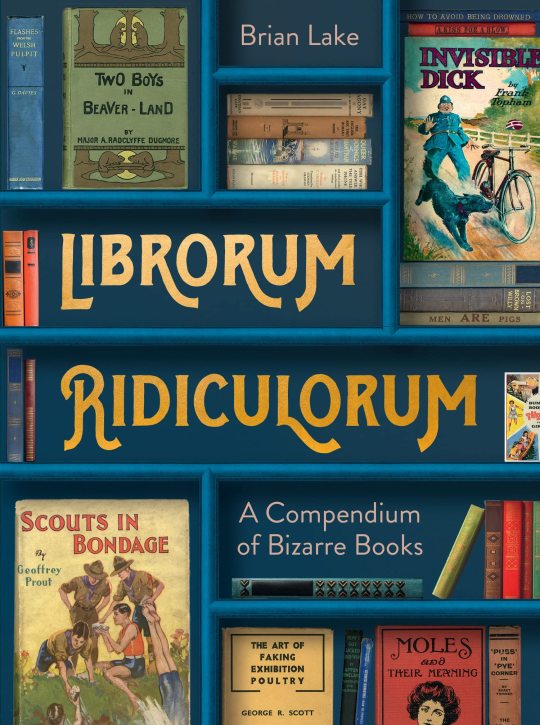
46. Librorum Ridiculorum by Brian Lake. This is a short, cute book of other books, those with weird titles and concepts. Some of them are examples of nominative determinism, like Mathematics for Engineers by Raymond Dull and Sewage Disposal From Isolated Buildings by Gerard Flood. Others are books with titles which have become suggestive over years of linguistic drift, like Drummer Dick’s Discharge or Stormcock in Trouble. If you like dick jokes, you’ll like this book. If you would like more dick jokes for your dollar, though, I suggest Bizarre Books by the same author, of which this is basically a hardcover, color excerpt from.

47. The Doomsday Book by Marshall Brain. This is the How Stuff Works guy, btw. This book, well, doesn’t work. It’s a list of catastrophes that could theoretically fall upon a city, country or planet, a look at the science behind them, and proposed solutions. The book starts strong, with a discussion of how the collapse of the Fort Peck Lake dam could lead to a chain reaction that would flood several major US cities and basically destroy the infrastructure of the American Midwest. And then immediately bungles it with a hysterical chapter about drone warfare, hysterical primarily in its gross overestimation of how competent AI is. This is a recurring theme. So is proposing enormous government overreach as the only way to stop the ever-present threat of terrorism, a fawning attitude towards Elon Musk, and a general sense of using a lot of words to say very little (he splits global warming up, for example, into like three different chapters, so he can re-explain it multiple times). Not recommended.

48. The Book of Phobias and Manias by Kate Summerscale. The organization of the book is from A-Z of the various disorders named, but the book is more interested in using what gets named and interpreted as a lens through which to view the history of psychology and psychiatry. Unsurprisingly, there’s a lot of Freudian analysis discussed, but in a critical light, and a lot of pre-Freudian psychology that I knew very little about and was interested to learn. The book also discusses the use of the words “phobia” and “mania” to discuss other cultural trends, like homophobia, xenophobia and Beatlemania, whether or not they fit the classic definitions (and the debate over the appropriateness of terms like homophobia and xenophobia).

49. The Hidden Company that Trees Keep by James B. Nardi. This is a weird, charming little book about the animals, plants and fungi that live in on and alongside trees. It’s mostly about different groups of arthropods, and of those mostly insects. The organization is overall by regions of the tree (referred to as LeafScape, BarkScape and RootScape), but within each chapter are mostly stream of consciousness discussions about different families of insects. The book is heavily illustrated, which is one of its major charms, and talks about some very obscure insect groups in an approachable manner. The overall feeling is of having a conversation with a distractible but knowledgeable entomologist. It’s probably going to annoy people who are looking for more structure, but I quite enjoyed the ride.
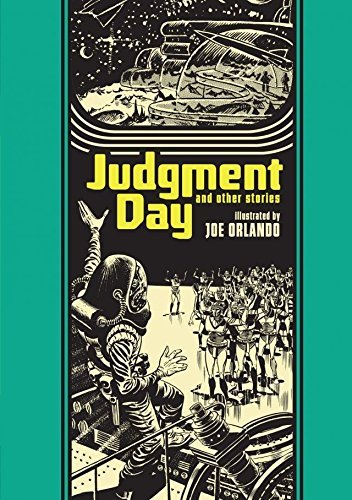
50. Judgment Day and Other Stories illustratedby Joe Orlando. This is one of Fantagraphics many nice hardcover collections of EC Comics stories, all of these science fiction, most from the pages of Weird Science and Weird Fantasy. The title story is a parable about racism that was censored and censured by the Comics Code Authority, and is generally one of the more famous comics of the era. Censorship and bigotry are recurring themes—I especially like the story where “the Reformers” try to introduce crime to Heaven in order to have a way to stoke fear to gain control. EC’s SF comics aren’t as famous as its horror, like Tales from the Crypt, but readers looking for ironic twist endings and gruesome gore will be well served by this collection too.
#reading log#ec comics#joe orlando#entomology#ecology#phobia#mania#psychology#popular science#bizarre books
7 notes
·
View notes
Note
fellowwww intp :3
tell me about your fandoms/ obsessions jdjdhdzkskdkd <3
WOOH BOY
OKAY
THIS MAY BE A LONG ONE
Well, I do have the majority of the fandoms I'm in on my pinned post so yeah
AS FOR OBSESSIONS-----
I tend to obsess over a certain amount of my ocs for some time like every few days or weeks and I think about them non stop until the new batch of ocs arrive
along with that I obsess over like a few songs for that amount of time too lmao
I kinda really love random/general/useless knowledge
Like phobias and manias? I LOVE phobias and manias! I have a whole book about em! (The Book of Phobias and Manias by Kate Summerscale, I highly recommend)
And
Um
This may make me sound weird (in a bad way) or whatever but-
Murder?
Like- serial killers, disturbing real life photos? Just generally twisted people?
Specifically over October I began learning and almost researching about some of the most horrible murderers out there like Jeffrey Dahmer, John Wayne Gacy, etc.
So uh yeah
That stuff fascinates me on a daily basis
Oh and Prismo x Scarab from Fionna and Cake
Never watched the show,(don't know where to watch it), but I just think they're neat. And the fanart of them is scrumptious.
Thank you for letting me tell ya about that stuff @holdmyteaplease, feels good to have it off my chest. <3
#not art#asks#talking#If you wanna talk about any of this stuff#SEND AN ASK OR MESSAGE ME!!! >:D#DON'T BE SHY!!!#I KNOW I WILL!!! :'D
5 notes
·
View notes
Text
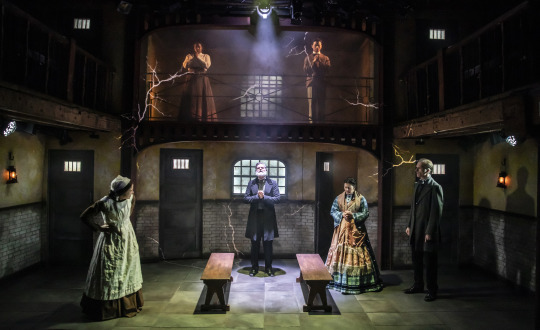



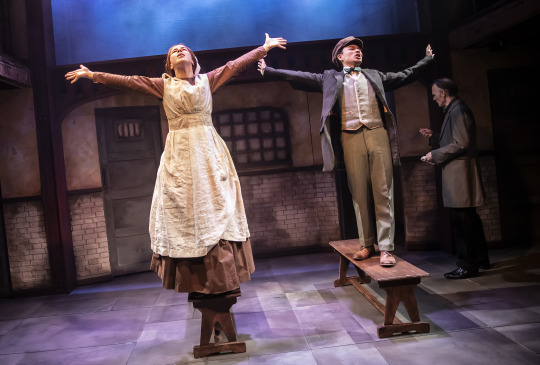
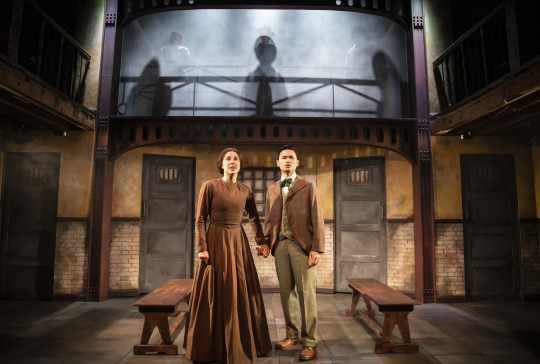
The Suspicions of Mr Whicher, by Kate Summerscale, Adapted by Alexandra Wood.
Produced and Performed at Watermill Theatre, Newbury. May 2023.
Directed by Kate Budgen
Design by Amy Jane Cook
Video Design by Rachel Sampley
Photos by: Pamela Raith
3 notes
·
View notes
Text
The Women's Prize for Non-Fiction 2025 Longlist is here!
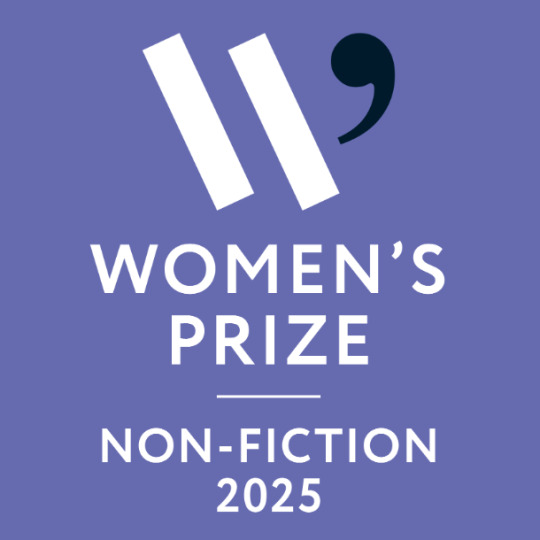
I've been following the Women's Prize for Fiction for several years now and I love that they've now launched a prize for non-fiction too. Women are still hugely underrepresented in non-fiction writing, so it's very much needed -not just for the winner but for the fantastic exposure it offers for the whole longlist and non-fiction written by women in general.
The Women's Prize for Non-Fiction is open to non-fiction written by women in English and published in the UK between 1st April of the year before the prize and 31st March of the year of the prize. So, this year's prize was available to books published between 1st April 2024 and 31st March 2025.
And here is the longlist!

Autocracy, Inc.: The Dictators Who Want to Run the World by Anne Applebaum. Published by Allen Lane on 23rd July 2024.
Embers of the Hands: Hidden Histories of the Viking Age by Eleanor Barraclough. Published by Profile Books on 19th September 2024.
The Eagle and the Hart: The Tragedy of Richard II and Henry IV by Helen Castor. Published by Allen Lane on 3rd October 2024.
A Thousand Threads by Neneh Cherry. Published by Fern Press on 3rd October 2024.
The Story of a Heart by Rachel Clarke. Published by Abacus on 3rd September 2024.
Raising Hare by Chloe Dalton. Published by Canongate on 26th September 2024.
Ootlin by Jenni Fagan. Published by Hutchinson Heinemann on 22nd August 2024.
Why Fish Don't Exist: A Story of Love, Loss and the Hidden Order of Life by Lulu Miller. Published by ONE on 10th October 2024.
Agent Zo: The Untold Story of Fearless WW2 Resistance Fighter Elżbieta Zawacka by Clare Mulley. Published by Weidenfeld & Nicolson on 16th May 2024.
By The Fire We Carry: The Generations-Long Fight For Justice on Native Land by Rebecca Nagle. Published by William Collins on 12th September 2024.
Wild Thing: A Life of Paul Gauguin by Sue Prideaux. Published by Faber & Faber on 12th September 2024.
What The Wild Sea Can Be: The Future of the World's Ocean by Helen Scales. Published by Grove Press on 6th June 2024.
The Peepshow: The Murders at 10 Rillington Place by Kate Summerscale. Published by Bloomsbury Circus on 3rd October 2024.
Sister in Law: Fighting for Justice in a System Designed by Men by Harriet Wistrich. Published by Torva on 2nd May 2024.
Tracker by Alexis Wright. Published by And Other Stories on 7th January 2025.
Private Revolutions: Coming of Age in a New China by Yuan Yang. Published by Bloomsbury Circus on 9th May 2024.
It's an amazing mix of topics and I'm pretty confident that it's a longlist with something for everyone. Whether you're a history buff, a nature lover, a memoir reader or a true crime fanatic, there is at least one book here that probably sounds fantastic to you.
For me, Embers of the Hands, Raising Hare, The Peepshow and Private Revolutions are standouts in terms of what I think I'd love. I haven't read any of them and The Peepshow is the only one I own. I have requested the other three that I'm particularly interested in from the library but Raising Hare has 12 reservations on just three copies, so it's unlikely I'll get my hands on that any time soon!
As someone who isn't a huge non-fiction reader, I'm so grateful to the Women's Prize for encouraging me to read more of it through this prize. Last year, I loved Wifedom by Anna Funder and I'm pretty sure I wouldn't have heard of it without the longlist, so I'm on the lookout for another hidden gem to find its way to me this year!
What do you think of the longlist? Have you read any of them? Do you want to? Let me know!
The Women's Prize for Non-Fiction 2025 shortlist of six books will be announced on 26th March and the winner will be announced on 12th June.
0 notes
Note
3, 4, 16, 17 for the book asks!!
3. What were your top five books of the year?
Dungeon Meshi (counting as 1!) - Ryoko Kui
A Heart That Works - Rob Delaney
Keanu Reeves Is Not In Love With You - Becky Holmes
Day One - Abigail Dean
Dying of Politeness - Geena Davis
4. Did you discover any new authors that you love this year?
I discovered Ryoko Kui! I’d never heard of Dungeon Meshi before this year and now I’m obsessed
16. What is the most over-hyped book you read this year?
I don’t really read books that have hype…. But maybe Kate Summerscale’s The Peepshow? I just wish there was more of her opinion in it!
17. Did any books surprise you with how good they were?
Katherine Ryan’s autobiography The Audacity was really good and made me think of her in a different (positive) light!
#ANSWERED#thank you!!!#i mainly read comedian autobiographies this year#and of course re-read the locked tomb like twice over
1 note
·
View note
Text
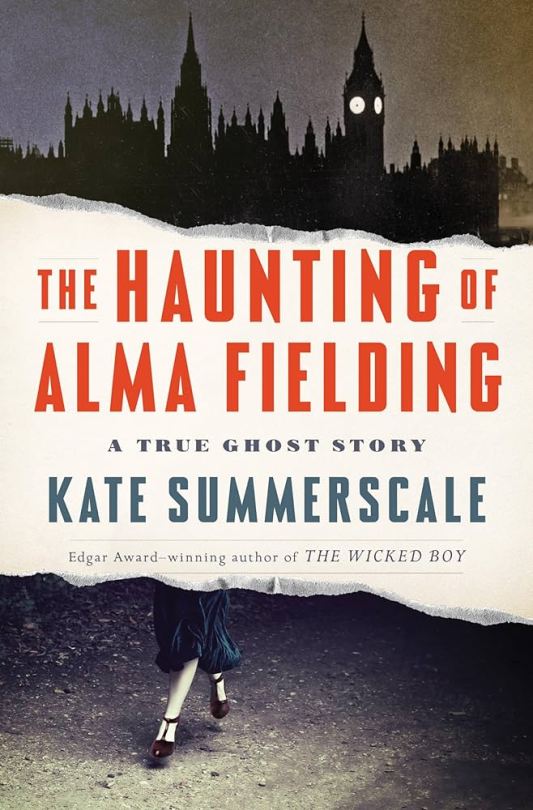
The Haunting of Alma Fielding. By Kate Summerscale. Penguin, 2020.
Rating: 3/5 stars
Genre: non-fiction, history, supernatural
Series: N/A
Summary: London, 1938. In the suburbs of the city, an ordinary young housewife has become the eye in a storm of chaos. In Alma Fielding's modest home, china flies off the shelves, eggs fly through the air; stolen jewellery appears on her fingers, white mice crawl out of her handbag, beetles appear from under her gloves; in the middle of a car journey, a terrapin materialises on her lap. Nandor Fodor - a Jewish-Hungarian refugee and chief ghost hunter for the International Institute for Psychical Research - reads of the case, and hastens to the scene of the haunting. But when Fodor starts his scrupulous investigation, he discovers that the case is even stranger than it seems. By unravelling Alma's peculiar history, he finds a different and darker type of haunting: trauma, alienation, loss - and the foreshadowing of a nation's worst fears. As the spectre of Fascism lengthens over Europe, and as Fodor's obsession with the case deepens, Alma becomes ever more disturbed. With rigour, daring and insight, the award-winning pioneer of non-fiction writing Kate Summerscale shadows Fodor's enquiry, delving into long-hidden archives to find the human story behind a very modern haunting.
***Full review below.***
CONTENT WARNINGS: blood, animal death, disturbing imagery, antisemitism, references to suicide, childhood sexual trauma, child death
I honestly knew nothing about this book when I picked it up. I found it at my library, and it sounded fun, so I checked it out.
This book is not so much a scary story as it is a summary of paranormal researcher Nandor Fodor's work with Alma Fielding - a 1930s housewife who is supposedly plagued by a poltergeist. The subject in itself is quite interesting; I really enjoyed learning about the revival of spiritualism after the Great War and how anxieties about the approaching World War II combined with psychoanalysis to produce interesting theories about the supernatural being simply a manifestation of suppressed emotion. I can also admire the amount of research required to write this book.
But the reason for my 3 star rating is purely subjective: I felt like I wasn't sold on the significance of Alma and Fodor's story. Sure, it was interesting, but I wanted more from the author about what drew her to this particular case and what insights she gained while researching. As it stands, the book feels primarily like a summary, which is fine but I do like it when authors inject their own frame into the research. It makes for much more compelling and interesting work, and I thought that was lacking in this account.
TL;DR: You might like this book if you're interested in the history of spiritualism and psychoanalysis. You're more likely to be disappointed if you're looking for a scary story or thriller.
0 notes